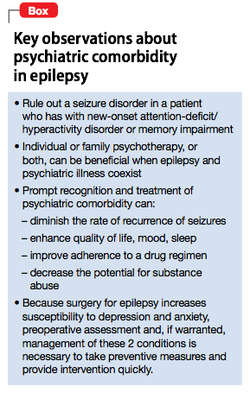
In the resource, "Managing Psychiatric Illness in Patients With Epilepsy" by Sowmya C. Puvvada, Satyanarayana Kommisetti, & Abhishek Reddy, readers can learn how to distinguish between features of epilepsy and signs/symptoms of common mental health conditions (such as substance abuse disorders, sleep disorders, and anxiety), discover the links between seizures and mental illness, and learn the preferred management and treatment strategies for depression and psychosis among those with seizure disorders along with gaining other clinical pearls.
"Patients who have epilepsy have a higher incidence of psychiatric illness than the general population—at a prevalence of 60%. Establishing a temporal association and making a psychiatric diagnosis can be vexing, but awareness of potential comorbidities does improve the clinical outcome. As this article discusses, psychiatric presentations and ictal disorders can share common pathology and exacerbate one another. Their coexistence often results in frequent hospitalization, higher treatment cost, and drug-resistant seizures. Risk factors for psychopathology in people who have epilepsy include psychosocial stressors, genetic factors, early age of onset of seizures, and each ictal event. Among ictal disorders, temporal-lobe epilepsy confers the highest rate of comorbidity" (Current Psychiatry).
 RSS Feed
RSS Feed
